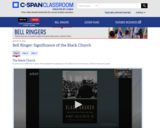
Historian and Harvard Professor Henry Louis Gates provided a history of religion and the importance of the church in Black communities.
- Subject:
- Social Science
- Material Type:
- Lesson
- Provider:
- C-SPAN
- Author:
- C-SPAN
- Date Added:
- 01/25/2023

Historian and Harvard Professor Henry Louis Gates provided a history of religion and the importance of the church in Black communities.

In his book, Reclaiming the Black Past, author and professor Pero Dagbovie explains how black history is taught in schools and used in popular culture including movies like Green Book. He discussed criticism of the way history is shown and the points of views that are highlighted.
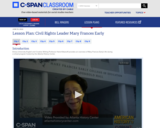
This lesson plan opens with reflective questions that ask students to reflect on their prior knowledge of Civil Rights leaders. Students then watch, analyze, and respond to an introductory video that presents an overview of Mary Frances Early's life and accomplishments. Next, students engage in an engagement activity, where they view seven video clips that detail various aspects of Early's life, including her childhood, her admission to the University of Georgia and accomplishment as the first African American student to graduate from the university, and her accomplishments and challenges throughout her life. Students then conduct research and compare Early to another Civil Rights leader of choice, preparing a presentation to share with their peers. The lesson concludes with a reflective video and writing prompt.
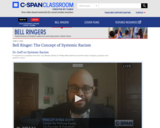
In response to a question from Sen. Cory Booker (D-NJ), Dr. Phillip Atiba Goff discussed the ideas of bigotry, prejudice and systemic racism.

Mary French, director of the Dictionary Project, discussed her organization’s work to promote literacy by giving dictionaries to students. She explains how Annie Plumber began the project and its impact over time.

American History TV presented live coverage from the National Museum of African American History and Culture on Washington, D.C.'s National Mall. They showed exhibits chronicling the African American story from slavery through the inauguration of the first African American president. This clip features legislation and the Domestic Slave Trade.
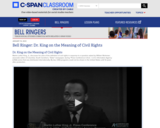
Martin Luther King, Jr., discusses his view of the definition of civil rights in response to a question asked by William Workman, associate editor of Columbia, South Carolina’s, "State" newspaper, during “Press Conference U.S.A.,” a U.S. Information Agency (USIA) series that was distributed internationally. By law, USIA programs could not be shown in the United States until 12 years after production.

Historian Erica Armstrong Dunbar talks about the early life of Araminta Ross (Harriet Tubman).
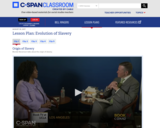
Slavery has existed around the world for generations. It has spanned across cultures and spread throughout continents, leaving its mark on families, communities, countries, governments and industry. Its reach continues to exist today. In this lesson, students will hear about the history of slavery and examine how it has evolved over time.

At the Virginia Museum of History and Culture in Richmond’s exhibit on 400 years of African American history, curator Karen Sherry described the first Africans who were bought to the Virginia colony as slaves in 1619.
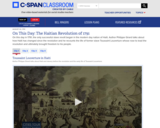
On August 22, 1791 the only successful slave revolt began in the modern day nation of Haiti. Author Philippe Girard talks about how Haiti has changed since the revolution and he recounts the life of former slave Toussaint Louverture whose rose to lead the revolution and ultimately brought freedom to his people.
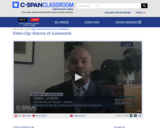
Director of the University of Texas - Austin's Center for the Study of Race & Democracy Peniel Joseph talked about the history of Juneteenth.
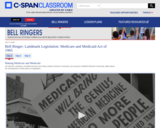
Jim Morone, professor of political science and urban studies at Brown University, and Laurence Kotlikoff of Boston University, talked about the creation, impact, and shortcomings of Medicare and Medicaid.
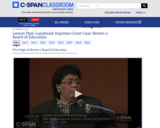
This is a lesson plan with short video clips and a variety of classroom activities used to engage students.

The Vietnam War was a conflict between communist North Vietnam and South Vietnam that began in 1955. However, the war took on a greater worldwide significance within the backdrop of the Cold War between the United States and Soviet Union. The United States involvement began as only sending military advisors, but continued to increase until they sent combat troops in 1965, and did not end until the signing of the Paris Peace Accords in 1973. However, the war did not officially end until the fall of Saigon in 1975. The involvement of the United States was very controversial within the country, and led to a large anti-war movement. In this lesson, students will learn about the causes, events, and impact of the Vietnam War within the United States and around the world.
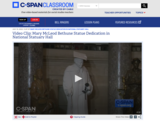
A statue of educator and civil rights activist Mary McLeod Bethune was dedicated as part of Congress’s National Statuary Hall. She is the first African American to be represented in the collection and was selected by the state of Florida. Rep. Val Demings (D-FL) makes remarks at the ceremony.

Professor Douglas Thompson talked this event and the impact it had on slavery throughout the Antebellum period.

On October 15, 1966, in Oakland, CA, Bobby Seale and Huey Newton founded the Black Panther Party. This group established their 10 Point Program outlining issues that were significant among members of the African American community, particularly with regard to the U.S. government. Included in these points was improving economic and social conditions among African Americans, establishing community programs, and ensuring safety in their communities. As their party grew, they coalesced with organizations across the country to grow awareness and promote change. View the videos below to learn more about this party and hear from some of its members.
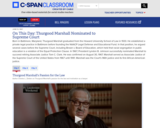
Born in Baltimore, Maryland, Thurgood Marshall graduated from the Howard University School of Law in 1933. He established a private legal practice in Baltimore before founding the NAACP Legal Defense and Educational Fund. In that position, he argued several cases before the Supreme Court, including Brown v. Board of Education, which held that racial segregation in public education is a violation of the Equal Protection Clause. In 1967, President Lyndon B. Johnson successfully nominated Marshall to succeed retiring Associate Justice Tom C. Clark. He was confirmed on August 30, 1967. Marshall served as Associate Justice of the Supreme Court of the United States from 1967 until 1991. Marshall was the Court's 96th justice and its first African-American justice.
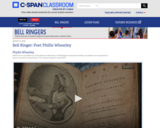
R. Scott Stephenson, Vice President of Collections, Exhibitions and Programming at the museum of the American Revolution explained the life and significance of Phillis Wheatley during the time of the American Revolution. During this time, Phillis Wheatley became the first published African American poet and was well known in England and the American colonies.